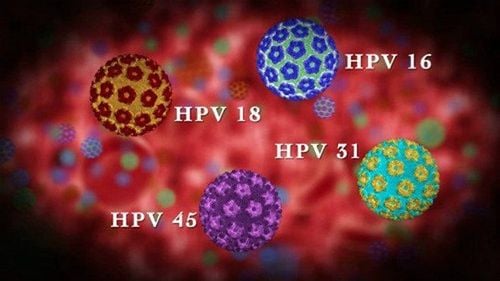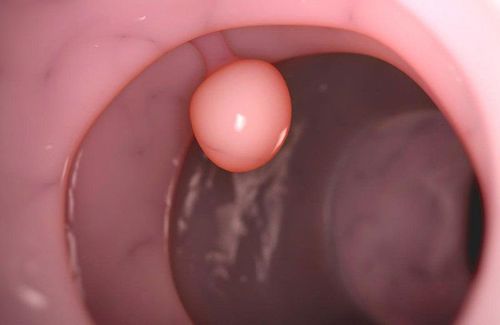This is an automatically translated article.
Throat cancer is a rapidly progressing disease. The disease is difficult to detect early because patients mistake it for a common cold. Therefore, people at high risk for the disease should have early screening for nasopharyngeal cancer.1. Tests to help diagnose nasopharyngeal cancer
Tests commonly used in the diagnosis of nasopharyngeal cancer include:NBI Endoscopy: NBI endoscopy can detect vascular proliferation in early cases of nasopharyngeal cancer, when mass Tumor is still localized, no lymph node metastasis. Thereby helping to achieve better treatment results and increase the cure rate. Biopsy: Biopsy of the nasopharynx through endoscopic equipment, especially under NBI endoscopy will give more accurate results because the tumor is observed more clearly. The person performing the procedure is able to obtain tissue from the site where cancer cells are thriving. Lymph node aspiration as FNA: Aspiration of the cervical lymph nodes sends biopsies and histopathology to identify and assess the extent of cancer. CT Scanner or MRI: CT Scanner helps to assess the extent of tumor invasion through imaging. Biochemical tests: IgA/VCA serological tests; IgA/EA; IgA/EBNA before, during and after treatment to assess disease prognosis.
2. Subjects needing screening for nasopharyngeal cancer

Những người xuyên hút thuốc lá uống bia rượu cần tầm soát ung thư vòm họng
People infected with Epstein-Barr virus: Epstein-Barr virus belongs to the Herpes virus group, the Epstein-Barr gene (DNA) has been detected. in cancer cells in the oropharynx People with chronic ear, nose and throat infections Occupation: The disease is common in people who work in rubber, synthetic plastics, people who are exposed to smoke, dust, carbon vapor, chemicals, radiation... Eating habits: People often eat sour and rancid fermented foods such as salted fish, smoked meat, pickled foods.. These foods contain a lot of Nitrosamine - a carcinogens Smoking habits, drinking alcohol and using stimulants Genetic factors: If someone in the family has cancer, other members are also more likely to have the disease. High-risk patients should be tested at least once a year. When you or a loved one has suspicious signs of the disease, it is advisable to conduct cancer screening tests to detect the disease early and treat it promptly to avoid the disease entering the metastatic stage.
3. Early warning signs of throat cancer
Signs of early nasopharyngeal cancer include:3.1 Neurological signs Headache appears early, on the same side as the tumor. The pain is dull in nature. In the early stages, the pain can be reduced with the help of painkillers. In the late stage, the pain becomes intense, less resistant to pain relievers.
3.2 Swollen lymph nodes in the neck Exploding lymph nodes at the angle of the jaw, increasing in size, often appearing on the same side as the tumor. Neck lymph nodes appear early, before signs of ears and nose. In the early stages, lymph nodes do not cause pain. In the late stages, lymph nodes enlarge, causing sores and pain to the touch.
3.3 Nasal congestion One side nasal congestion, worsening over time. In the late stages, blood may be seen in the mucus or frequent nosebleeds.
3.4 Tinnitus Constant tinnitus on one side, gradually increasing in nature. Over time, it can lead to hearing loss, otitis media and purulent ear discharge.
Symptoms of headache, tinnitus, and stuffy nose are easily confused with common colds, medical diseases of nerves and blood vessels, and diseases of the ear, nose and throat. Therefore, patients need to pay attention, if flu treatment does not go away, they need to go to the hospital to screen for oropharyngeal cancer.

Ù tai là một trong những dấu hiệu cảnh báo của ung thư vòm họng
4. Treatment of nasopharyngeal cancer
Throat cancer can be treated with radiation therapy, chemotherapy, surgery, or a combination of these methods. Throat cancer is detected at an early stage, treatment will give very satisfactory results.5. Prevention of nasopharyngeal cancer
Lifestyle changes and healthy living habits can reduce the risk of oropharyngeal cancer:Eat more vegetables and fruits Avoid salted foods such as pickles, salted fish and fermented foods that have contains a lot of nitrosamines Do not smoke, drink alcohol Regularly exercise to improve the body's resistance Go for regular health check-up Packages for screening, and early detection of nasopharyngeal and laryngeal cancers , larynx is applied in health examination services at hospitals of Vinmec International General Hospital system.
The screening package is applied to customers who are > 30 years old, have a high risk of oropharyngeal cancer such as genetic factors, heavy smoking and alcohol consumption, and abnormal symptoms such as bleeding. orange, headache, tinnitus, stuffy nose, lymphadenopathy in the neck. When using the examination package, customers will be screened for oropharyngeal cancer through General ENT examination with hard or soft endoscope and software ultrasound.
The technique is performed in the condition of modern machinery and equipment combined with a team of highly qualified doctors and a comprehensive treatment and care regimen for patients.
Customers can visit directly at the hospitals of Vinmec International General Hospital system or contact the hotline to book an appointment here
MORE:
Why screening for nasopharyngeal cancer is a way to prevent The best cancer prevention today 7 points to note to help prevent oropharyngeal cancer Signs of throat cancer in children













